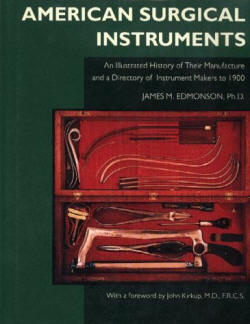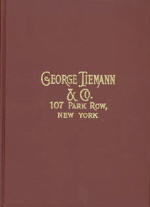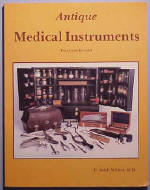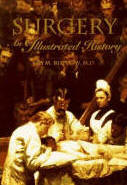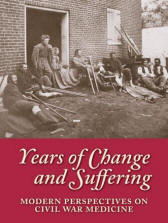Retail Books and References About American Surgical Antiques
All these books can be obtained on Amazon unless they are out of print
American Surgical Instruments: by Edmonson "An Illustrated History of their Manufacture and a Directory of Instrument Makers to 1900" by James M. Edmonson, Ph.D., Curator, Dittrick Museum of Medical History, Cleveland Medical Library Association and Case Western Reserve University. This is the best book specifically on American Surgical Instruments for collectors and highly recommended if you are going to collect American surgical antiques. It covers the period from the Revolutionary War of 1776, through the Civil War, and down to 1900. It is about all the American makers of the time and shows hundreds of sets and individual instruments to which you can make comparisons. If you want to collect Civil War sets, this book is invaluable because it contains so many examples of real Civil War sets. If you are looking for the ideal gift for any Civil War medical collector, this book is perfect and a lifetime of information. This book is my bible and without it, I would never have been able to accumulate this collection or enjoy the information so freely shared by the author. I highly recommend this book as a reference for any serious medical collector. This book and content is referenced throughout this site as "Edmonson".
George Tiemann Instrument Catalog 1889: Extensive information on individual surgical instruments in the 1879 reprint of Tiemann's Surgical Instruments which has thousands of drawings and descriptions of surgical instruments. A reprint by Norman Publishing. This text is a must have if you are researching or collecting instruments from the 1800's. You can also access an earlier version of this book via Google's digital books.
Civil Ward Medicine: Challenges and Triumphs, Alfred Jay Bollet
Dr. Jay Bollet wrote this book to clear up a lot of misconceptions about surgeons and surgery during the Civil War. It is the best researched and documented book I have read about medical treatment during the War. It covers almost any topic you can imagine related to the Medical Department, surgeons, surgery, medicine, and famous Medical Department individuals. It dispells many of the myths about who and what the surgeon were and did. I highly recommend this book to anyone collecting Civil War medical. Here is a synopsis of the book: Civil War Surgery: The truth
Antique Medical Instruments, by Keith Wilbur, MD. This paperback book is an excellent general reference for instruments, but intermingles both American and European instruments and information. It's a good place to start if you want to identify a variety of medical instruments, but is not as useful for serious collectors as Tiemann's or Edmonson's book above. Warman's Civil War Collectibles: Identification And Price Guide (Paperback) by Krause Publishing. 3rd edition now available. In this one complete fact-packed guide you'll find everything from bayonet-tipped rifles used in fierce battles, and tintypes of proud fighting men posing for their loved ones, to boots worn on long dusty marches, flags and drums that stirred the troops, and diaries. In addition to valuable pricing and historical facts, in this book you'll discover: 1,000 color photos for instant identification; 3,000 price listings of U.S., Confederate, and foreign-made items; medical items used during the War; Weapons, uniforms, accoutrements, flags, photos, personal items and ephemera; Critical reproduction alerts and collecting advice.
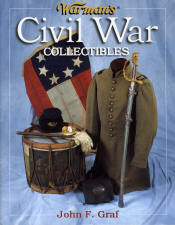
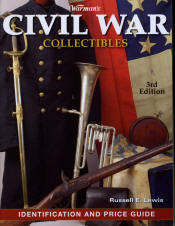
Surgery: An Illustrated History, by Ira Rutkow. An excellent review of surgery in the American History. Published by Norman Publishers, it is lavishly illustrated and would be an excellent gift for a surgeon friend or doctor who you wish to thank profusely.
Medicine: perspectives in history and art. A New book from Dr. Robert Greenspan. This huge book (595 pages, 9.5 x 12.25 x 2 inches) on medical history and art will make a great graduation or 'thank you' gift for that special doctor in your life. It is also a major resource for collectors and medical history research. Please contact the author, Robert Greenspan, MD to directly purchase this outstanding book. Years of Change and Suffering, by James Schmidt and Guy Hasegawa. Correcting the pervading myths of Civil War medicine perpetuated by Hollywood dramatizations, this exploration covers how the sick and wounded were treated on both sides of the Mason-Dixon Line. Through detailed research, these essays show there were actually too few amputations, contrary to popular belief; there were many advances made in the understanding and treatment of diseases and wounds to the nervous system, and new surgical techniques were used to treat battlefield injuries once thought to be certainly fatal. These topics and more are treated by experts in their respective fields, including medical education, science, invention, neuroscience, and mental health. This book is more for the medical researcher or collector who wants to dig deeper than a superficial read. Excellent references and bibliography. For an excellent summary of Civil War medicine by Christiane Henrich, see an article titled EVALUATING THE LEGACY OF CIVIL WAR MEDICINE:
AMPUTATIONS, ANESTHESIA, AND ADMINISTRATION
Published in the 'Concord Review', 2009
Some Civil War instrument references (Especially the three paper-backed volumes by Dammann on Civil War medical instruments) have been omitted due to a number of mistakes and repeated misinformation. Unless you are an advanced collector these three paper-back books could lead you to make some expensive mistakes as I did when I first started collecting, thus their omission in this list.
American Civil War Surgery Series (11 volume set) (Hardcover) Edited by Ira. M. Rutkow, M.D., Dr. P.H. A group of eleven reprinted Civil War surgery manuals and related topics. This series reprints the first editions of the surgical manuals that Union and Confederate soldiers studied and took with them to the battlefields. Available from the Printer: Norman Printing or on Amazon.
This series reprints the first editions of the surgical manuals that Union and Confederate soldiers studied and took with them to the battlefields.
Volume 1: S. D. Gross: A Manual of Military Surgery (Philadelphia, 1861). 186pp. 3¾" × 6". . . essentially a book for emergencies; portable, easy of reference, always at hand" (from the preface).
Volume 2: Surgeon-General: A Manual of Military Surgery, Prepared for the Use of the Confederate States Army (Richmond, 1863). Surgeon-General. 297pp. 30 plates. 4-7/16" × 6-15/16" . . . confined to those affections most intimately connected with gun-shot wounds and operations, as Shock, Tetanus, Hospital Gangrene, Pyaemia, &c." (from the preface). This is the only extensively illustrated Confederate surgical manual.
Volume 3: S. W. Mitchell, G. R. Morehouse, W. W. Keen: Gunshot Wounds and Other Injuries of Nerves (Philadelphia, 1864). 164pp. 4-1/16" × 7-3/8". Based on research done at the Battle of Gettysburg, this acknowledged medical classic contains the first detailed study of traumatic neuroses and introduced the concept of causalgia.
Volume 4: J. J. Chisolm: A Manual of Military Surgery (Richmond, 1861).
447pp. 4-3/4" × 7-3/16". . . I have incorporated chapters upon the food, clothing and hygiene of troops; with directions on how the health of an army is to be preserved, and how an effective strength is to be sustained; also, the duties of military surgeons, both in the camp and in the field" (from the preface).Volume 5: F. H. Hamilton: A Practical Treatise on Military Surgery (New York, 1861). 232pp. 30 illus. 5-3/4" × 8-13/16". Chapters discuss "examination of recruits," "hygienic management of troops upon the march," and "conveyance of the sick and wounded." The appendix details camp cooking (with recipes) for a large group of soldiers.
Volume 6: E. Warren: An Epitome of Practical Surgery for Field and Hospital (Richmond, 1863). 401pp. 4-1/2" × 7-3/8". Surgeon-General of North Carolina, Warren wrote this book to counter the severe mismanagement of the wounded.
Volume 7: C. S. Tripler and G. C. Blackman: Handbook for the Military Surgeon (Cincinnati, 1861).121pp. 5" × 7-5/8". Chapters cover organization of field hospitals; gunshot wounds; amputation; wounds of the chest, abdomen, arteries and head; and the use of chloroform. The appendix includes forms for requisitions, accounts of purchases, surgeons' reports and hospital payrolls.
Volume 8: S. Smith: Hand-book of Surgical Operations (New York, 1862). 279pp. 257 illus. 4-3/8" × 6-5/8". Smith's Hand-book went through five editions within two years and was the most widely used surgical manual among the Union forces.
Volume 9: F. Formento and M. Schuppert: Notes and Observations on Army Surgery (New Orleans, 1863).
62pp. BOUND WITH: A Treatise on Gunshot Wounds: Written for and Dedicated to the Surgeons of the Confederate States Army (New Orleans, 1861). The Louisiana Hospital, established by Formento in 1861, had a much lower mortality rate than regular army hospitals; this was attributed to his insistence on small wards, extreme cleanliness, good food, and ample fresh air. Both Formento's work and Schuppert's treatise on gun-shot wounds, bound with it, are little known and virtually impossible to find in their original editions.Volume 10: J. H. Packard: A Manual of Minor Surgery (Philadelphia, 1863). 288pp. 4-5/8" × 7-1/4". The thirteen chapters include discussions of such items as pocket-case materials used in dressings, surgical depletion, bandages, disinfectants, and catheterization-injections.
Volume 11: Adjutant-General and Surgeon-General.: List of Battles and Roster of Regimental Surgeons and Assistant Surgeons During the War of the Rebellion (with a new index to names) (Washington, D.C., 1883). 386pp. 5½" × 8½". With a new index to names created for our series, this volume will enable you to determine exactly which surgeons were attached to each regiment, and to identify the specific battles in which each surgeon served.
